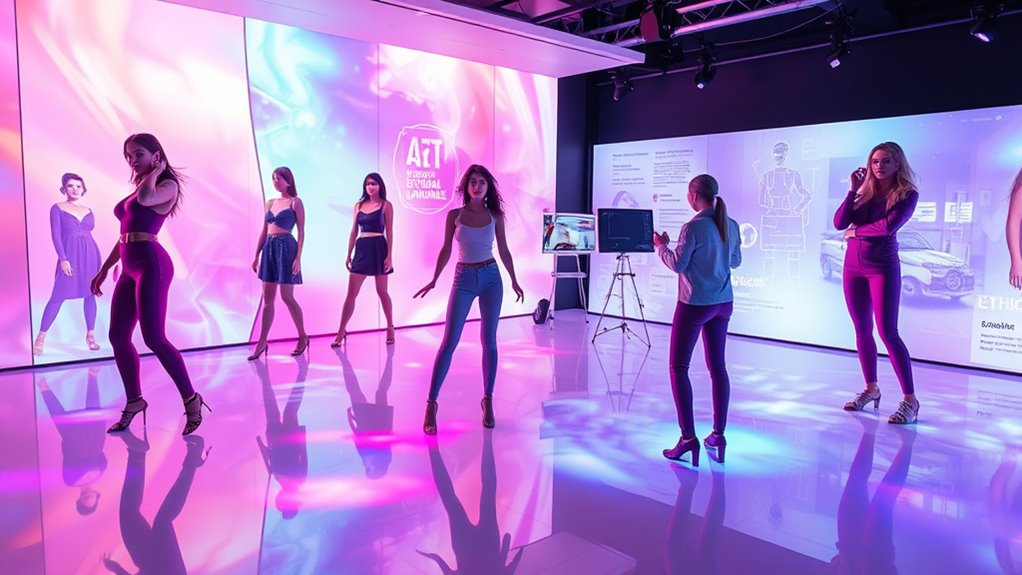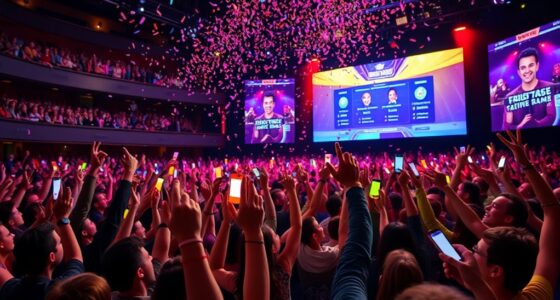Celebrity AI avatars offer exciting opportunities for fan engagement but bring up significant ethical concerns. You might wonder about the authenticity of interactions and how these virtual representations could affect real-life relationships. There’s also the issue of consent, especially if a celebrity hasn’t approved the use of their likeness. Balancing innovation with respect for artistic integrity is essential. If you explore further, you’ll uncover deeper insights into these complex implications.
Key Takeaways
- The creation of AI avatars can occur without a celebrity’s consent, leading to potential legal and ethical dilemmas regarding likeness and exploitation.
- AI avatars blur the lines between real and virtual interactions, potentially diminishing the value of genuine human relationships and celebrity authenticity.
- New storytelling opportunities arise from AI avatars, allowing posthumous portrayals of characters, yet they challenge original artists’ creative control and integrity.
- Ethical discussions are essential to determine who controls and profits from digital celebrity representations, impacting individual rights and societal values.
- The evolution of celebrity culture is influenced by public perception, shaping the responsible development and use of AI avatars in entertainment.
As technology advances, you might find yourself captivated by the rise of celebrity AI avatars, which blend the allure of stardom with cutting-edge artificial intelligence. These digital personas can mimic the voices, mannerisms, and even the personalities of your favorite stars, allowing for unique interactions that were unimaginable just a few years ago. But while they’re fascinating, you should also contemplate the ethical and creative implications they bring to the table.
Imagine chatting with an AI version of a beloved actor or musician. You could ask questions, get advice, or even enjoy a personalized concert experience. It’s an exciting prospect, but it raises questions about authenticity. When you interact with an AI avatar, are you really connecting with the celebrity, or just a digital facsimile? You might find yourself pondering how this impacts the way we value genuine human interaction versus virtual experiences.
Then there’s the matter of consent. Celebrities often have to navigate complex relationships with their own images and identities. If an AI avatar is created without a celebrity’s blessing, it can lead to legal and ethical dilemmas. You wouldn’t want your likeness exploited for profit without your permission, right? As you explore the world of celebrity AI avatars, it’s essential to think about who gets to control these digital representations and how that affects the individuals behind the fame.
On the creative side, AI avatars open up new opportunities for storytelling and entertainment. You might envision a future where your favorite stars can reprise their roles in sequels or spin-offs, even after they’re no longer with us. While this can be thrilling, it also poses challenges regarding artistic integrity. How much creative input should the original artist have in their AI representation? You’ll need to consider whether it’s respectful to continue portraying a character or story long after the creator has passed away.
In a world where celebrity AI avatars become more prevalent, you can expect ongoing discussions about the balance between innovation and ethics. You might feel excited about the possibilities, but it’s essential to remain aware of the implications. As you explore this fascinating intersection of technology and celebrity culture, keep questioning the boundaries of creativity and consent. Your perspective can contribute to shaping the future of digital fame, ensuring it aligns with ethical standards while still embracing innovation.
Frequently Asked Questions
Can AI Avatars Replace Live Performances by Celebrities?
AI avatars can’t fully replace live performances by celebrities. While they can deliver impressive visuals and sounds, they lack the genuine connection and spontaneity that live shows offer. You miss the energy of a crowd, the artist’s emotional nuances, and the unique moments that happen in real-time. Fans crave that personal experience, which AI simply can’t replicate. So, while AI avatars might enhance entertainment, they can’t replace the magic of live interaction.
How Are Celebrity Likenesses Protected by Law?
Celebrity likenesses are protected by laws like right of publicity, which gives individuals control over how their image and identity are used commercially. You can’t just use a celebrity’s likeness without permission, as it can lead to legal issues. Depending on the jurisdiction, these rights may extend beyond a celebrity’s lifetime, protecting their estate. So, if you’re considering using a celebrity’s image, it’s essential to get the necessary permissions first.
What Happens to AI Avatars After a Celebrity’s Death?
After a celebrity dies, their AI avatars can still be used, but it gets complicated. You might wonder who controls their likeness and how it’s managed. The estate usually steps in, deciding how the avatar’s used, which can lead to legal battles. With potential profits at stake, some might exploit this technology while others protect the legacy. Ultimately, the fate of these avatars hinges on agreements made before and after the celebrity’s passing.
Can Fans Create Their Own Celebrity AI Avatars Legally?
Yes, you can create your own celebrity AI avatars, but you need to be cautious. Legally, you must avoid infringing on the celebrity’s likeness, trademarks, or copyrights. If you’re using their image or voice without permission, you could face legal issues. It’s best to create something inspired by them rather than directly copying. Always check the laws in your area to guarantee you’re staying within legal boundaries while expressing your creativity.
Are There Any Ongoing Lawsuits Related to Celebrity AI Avatars?
Yes, there are ongoing lawsuits related to celebrity AI avatars. Several celebrities have filed lawsuits against companies that use their likenesses without permission, claiming violations of their rights. You might find cases involving unauthorized use of images or voices particularly interesting, as they touch on issues of consent and copyright. As the technology evolves, the legal landscape will likely continue to change, so staying updated on these developments is essential.
Conclusion
As we navigate the world of celebrity AI avatars, we must weigh the allure of innovation against the shadows of ethics. You’ll find excitement in the creativity they inspire, yet caution in the questions they raise. Embrace the potential for storytelling, but remain vigilant about authenticity. Celebrate the artistry they bring, while questioning the implications of representation. In this delicate dance of admiration and scrutiny, let’s forge a path that honors both imagination and integrity.









